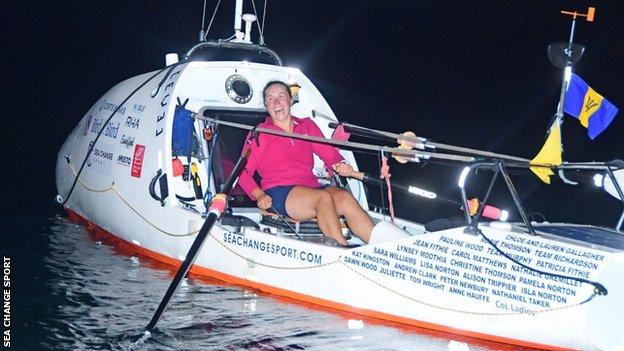Victoria Evans: Solo Atlantic rowing record set by British lawyer
- Published

Evans spent her 35th birthday alone at sea
Britain's Victoria Evans has set a new record for the fastest female solo crossing of the Atlantic Ocean.
The lawyer, 35, had previously never rowed before taking on the challenge.
Evans rowed 2,559 nautical miles (4,740km) in a world record time of 40 days and 19 hours, beating the previous record of 49 days and seven hours set by fellow Briton Kiko Matthews in 2018.
She set off from Tenerife on 11 February before arriving at Port St Charles in Barbados on Thursday.
Evans had to deal with postponements for over a year, due to the Covid-19 pandemic and its associated travel restrictions.
Upon reaching dry land, an exhausted and emotional Evans said: "A solo expedition is about so much more than one person. Taking on this epic challenge was about driving positive change, inspiring others and using the achievement as a platform to progress the narrative about women in sport.
"Completing the crossing is just the start of the work I intend to do in this field and I can use this experience to show that we are capable of anything, after all, actions speak louder than words."
Evans is aiming to raise £50,000 for the Women In Sport charity, and gave up her job and her home in order to make the crossing.
The charity's chief executive Stephanie Hilborne said: "How mind-boggling to be at sea with sharks and dolphins for company and to overcome such massive obstacles to reach the finish line?
"This is the culmination of years of dedicated work to build the right boat, the right fitness, and break out of lock-downed Europe even before overcoming huge waves, storms and physical and mental exhaustion.
"Victoria's battles represent the battles that girls and women face every day to break out of stereotypes, to overcome limiting expectations, to beat back the storm of misogyny and sexual harassment and beat a path for themselves towards the joy and exhilaration of sport."

Who were the real Peaky Blinders?: Explore the origins of this mass gang movement
The rise of the American far right: Louis Theroux meets the movement's key figures
